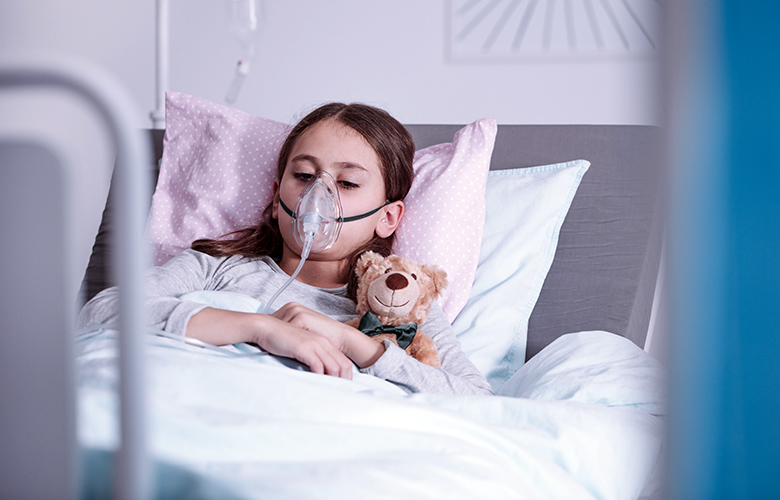What causes streptococcus and in which cases it is life-threatening
The pyogenic streptococcus and respiratory syncytial virus (RSV) are two of the most common causes of infection in children, but they also affect the elderly, with effects ranging from mild to very severe in some cases. There is currently no vaccine that protects against streptococcus, while the recently approved RSV vaccine is not available in Greece.
What does streptococcus cause and in what cases is it life-threatening?
Pyogenic streptococcus is a bacterium that exists on the skin or in the nasopharynx of humans, says pediatrician-infectious disease specialist Ioannis Kavaliotis, who was director of the Pediatric Clinic at the Special Diseases (Infectious) Hospital in Thessaloniki, speaking to APE-MPE. He also notes that some are carriers and others sometimes get sick. As Mr. Kavaliotis explains, pyogenic streptococcus causes a variety of infections such as tonsillitis, infectious wax, otitis, pneumonia, rhinosinusitis, scarlet fever. It also causes more serious (and rarer) invasive conditions, such as erysipelas, cellulitis, bacteremia, necrotizing fasciitis, osteomyelitis, meningitis, toxic shock syndrome.
“Infiltrating infections are more commonly seen in the elderly, at a very young age, or in people with risk factors (substance use, alcoholism, immunosuppression). Non-suppurative complications of streptococcal infections are rheumatic fever, rheumatic heart disease, and acute glomerulonephritis. The incidence of streptococcal infections is not small. For example, approximately 620,000,000 cases of tonsillitis are estimated annually, 162,000,000 cases of infectious wax, 33,000,000 cases of rheumatic heart disease. The mortality from streptococcal infections (GAS) approaches 500,000 deaths annually, worldwide. Simple streptococcal infections have a very good prognosis, while invasive infections (mainly fasciitis and toxic shock) have a high mortality rate of 15-25%”, points out Mr. Kavaliotis.
Streptococcal pharyngitis, when is it necessary to check?
“The danger of tonsillitis is mainly the development of rheumatic fever as a complication. In children under the age of 3, streptococcus is rare as a cause of infection and this risk practically does not exist. Therefore, the test for streptococcal pharyngitis is applied to children over 3 years of age. In other words, a strep test is done and if it is positive, treatment is administered. If it is negative, we continue with pharyngeal smear culture and, depending on the result, we treat or not. In children under 3 years of age, control and treatment are usually applied when there is another patient in the immediate environment with proven pharyngotonsillitis or when the symptoms in the child are very intense and classic for an infection of microbial etiology,” says Mr. Kavaliotis.
How is strep spread?
Transmission occurs through contact with the sufferer, with nasopharyngeal secretions or with any trauma. Dispersal is seen up to 3 weeks after infection (taking an antibiotic stops transmission after 24 hours). The transmission takes place even if the sufferer or carrier of the bacterium is asymptomatic.
What are the symptoms and how is the diagnosis made?
“There are different types of disease, from mild to severe. The latter can be fatal. The symptoms vary according to the form of the infection (e.g., it is pharyngotonsillitis, infectious wax, etc.). In the US, there are millions of cases of mild infection each year, about 12,000 severe cases, and about 1,500 deaths. The diagnosis is made with a Strep test and culture of a pharyngeal smear,” says Mr. Kavaliotis.
What is recommended for treatment and who is at risk of serious infection?
Treatment is with antibiotic administration. After receiving for 24 hours the child can return to school as long as he is generally well. Prevention of the main complication of rheumatic fever is achieved even if the antibiotic is given within the first week (up to 9 days) of diagnosis. Severe infection requires hospitalization. Risk groups for severe infection are the immunocompromised, those with underlying diseases and those who have recently had another viral infection. To prevent these infections, Mr. Kavaliotis recommends the simple means of personal and general hygiene, i.e. good hand washing and cleanliness of any wound.
Respiratory syncytial virus infection
As stated by Mr. Cavaliotis RSV is a common respiratory virus and causes mild cold symptoms. In Europe it is seen in approximately 213,000 children per year and in 158,000 adults.
“RSV is spread from person to person by droplets when they breathe, talk, cough or sneeze. Kissing (eg parent to child) is a cause of transmission. It can also be transmitted by contaminated surfaces that will be touched by hands and the hands will then touch the mouth, nose, eyes. The incubation period is 2-8 days and the symptoms are cough, sneezing, fever, runny nose, wheezing. In infants, the following may coexist: irritability, decreased appetite, tachypnea, apnea. In children up to 5 years: tachypnea, dysphagia, septic condition, while in adults: sore throat, headache, fatigue. Severe infection can occur in infants under 6 months of age, people over 65 years of age and immunosuppressed people who, together with people with underlying diseases, constitute the risk groups for RSV infection. Pregnant women are a special risk group. Treatment is symptomatic treatment. But most patients recover within a week without treatment.” explains Mr. Kavaliotis.
According to Mr. Kavaliotis, the symptoms that indicate complications and seriousness are: breathing difficulty, flapping of the nose wings, i.e. opening of the nose entrance with each breath, interpleural indentations (pay attention to the spaces between the ribs), cyanosis of the lips, acrocyanosis. Infants may develop sepsis, while adults have heart attacks. For prevention, general preventive measures are recommended, covering the mouth when coughing, etc., confining the patient to the house.
Regarding the vaccine for RSV, which is not yet available in Greece, Mr. Kavaliotis states that two vaccines have recently been approved for people over 60-65 years of age. One of them was also approved for administration to pregnant women in order to protect newborns and infants 0-6 months from RSV infections (through transmission of antibodies). “As for infants, they are protected either through the mother (as we mentioned above) or by immunization with a monoclonal antibody (which is also not available in our country) which is administered to infants born during the RSV season” adds Mr. Kavaliotis .




